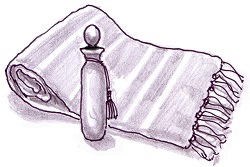
“You always have the poor with you, but you do not always have me” (John 12:8).
Monday of Holy Week
Is 42:1-7; Ps 27: John 12:1-11
Holy Week 2023 continues with Scripture readings from Isaiah 42, Psalm 27 and John 12 that seem to describe a warrior planting his feet firmly in preparation for battle. But he has no weapons except trust in God and in the ultimate victory of justice over oppression. Jesus, reclining at table in Bethany, has been aware since his baptism that he is God’s Servant, the Christ – anointed one. He knows that the final Passover he will celebrate with his disciples will culminate in the sacrifice of the Lamb of God – himself – to signal the great Exodus from sin to freedom, through death to new life.
After his triumphal entry into Jerusalem, Jesus had retired to Bethany to the home of Martha, Mary and their brother, Lazarus, whom Jesus had raised from the dead. The mood of this victory dinner is disrupted by Mary’s act of anointing Jesus with a very costly liter of aromatic nard, a burial rite, and the disciples are shocked by Mary’s implication. Judas criticizes her for an extravagant waste that could have been spent on feeding the poor.
Jesus knows that Mary alone understands that he is about to die. As she grieves for him, her heart breaks open like the sealed container of perfume, and its fragrance fills the house. Jesus utters the famous line, “You will always have the poor with you,” an indictment of the world’s neglect of those most in need of love. The very source of God’s compassion is now present in their midst, but they do not recognize him. The disciples are about to lose him, and they still do not grasp what Jesus is about to accomplish on their behalf.
Mary’s passionate show of love for Jesus by washing and anointing his feet will appear in the next chapter of John’s Gospel. Her gift to Jesus will be his final gift to his disciples. Only after his death will they begin to understand the depth of his love for them, expressed by his kneeling to wash their feet at the Last Supper. This dramatic example summarizing all his teaching will substitute for the institution of the Eucharist portrayed in the other Gospels. It conveys deeply the meaning of the death of Jesus in the “breaking of the bread.” In a few days on Holy Thursday in our parishes, we will repeat this ritual for one another.
Other connections are possible. Lazarus’ presence at the table reminds us of Luke’s story of the poor man of the same name whose wounds are licked by dogs. That parable ends with Jesus’ words that even if someone were to rise to the dead, some would still not heed his decisive warning to care for the poor. This final sign in the fourth Gospel will go unheeded as Jesus begins his Passion. Only after his Resurrection will the connection between his return and our response of justice for the poor be clear. This is the unmistakable sign at the heart of the Gospel. The poor are always with us to remind us that God hides among them waiting to be served.
Our ritual of foot washing on Holy Thursday will impress this connection between action for justice and our reception of the Eucharist, an empty sign if we do not live it by caring for one another in loving service.